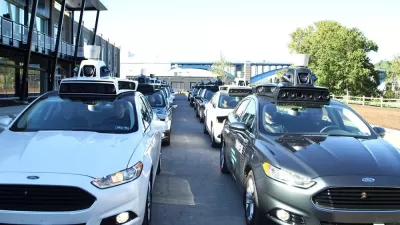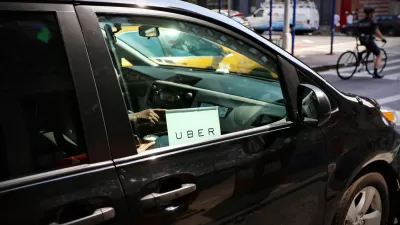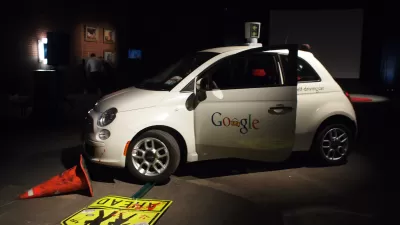So far, only a small minority of major cities have considered self-driving cars in their long-range transportation plans. The question is, should policymakers embrace them or stand in their way?

Citing a report from the National League of Cities, Kim-Mai Cutler contends that many American cities are ignoring self-drivers in their long-range planning. "What's even more surprising is that only 3 percent of these cities' transit plans are even taking into account the impact of ride-hailing companies like Uber and Lyft even though they already operate in 60 of the 68 largest markets in the U.S."
Prospects for autonomous vehicles are intimately tied to land use policy. "The concern is that if suburban governments shirk at designing better, more compact physical space, the additional efficiencies and comforts of self-driving cars will just induce longer mega-commutes and more sprawl, which is bad for the environment."
Much of this hinges on whether self-driving cars (if they catch on) will be privately owned or shared via a transit-like utility. "It's concerning because no one actually knows how much efficiency self-driving cars can really provide. It could be a repeat of the 1940s when streetcar lines in U.S. cities like Los Angeles were dismantled to make way for cars and buses."
FULL STORY: How Many American Cities Are Preparing For The Arrival of Self-Driving Cars? Not Many.

Alabama: Trump Terminates Settlements for Black Communities Harmed By Raw Sewage
Trump deemed the landmark civil rights agreement “illegal DEI and environmental justice policy.”

Study: Maui’s Plan to Convert Vacation Rentals to Long-Term Housing Could Cause Nearly $1 Billion Economic Loss
The plan would reduce visitor accommodation by 25% resulting in 1,900 jobs lost.

Why Should We Subsidize Public Transportation?
Many public transit agencies face financial stress due to rising costs, declining fare revenue, and declining subsidies. Transit advocates must provide a strong business case for increasing public transit funding.

Paris Bike Boom Leads to Steep Drop in Air Pollution
The French city’s air quality has improved dramatically in the past 20 years, coinciding with a growth in cycling.

Why Housing Costs More to Build in California Than in Texas
Hard costs like labor and materials combined with ‘soft’ costs such as permitting make building in the San Francisco Bay Area almost three times as costly as in Texas cities.

San Diego County Sees a Rise in Urban Coyotes
San Diego County experiences a rise in urban coyotes, as sightings become prevalent throughout its urban neighbourhoods and surrounding areas.
Urban Design for Planners 1: Software Tools
This six-course series explores essential urban design concepts using open source software and equips planners with the tools they need to participate fully in the urban design process.
Planning for Universal Design
Learn the tools for implementing Universal Design in planning regulations.
Smith Gee Studio
Alamo Area Metropolitan Planning Organization
City of Santa Clarita
Institute for Housing and Urban Development Studies (IHS)
City of Grandview
Harvard GSD Executive Education
Toledo-Lucas County Plan Commissions
Salt Lake City
NYU Wagner Graduate School of Public Service





























